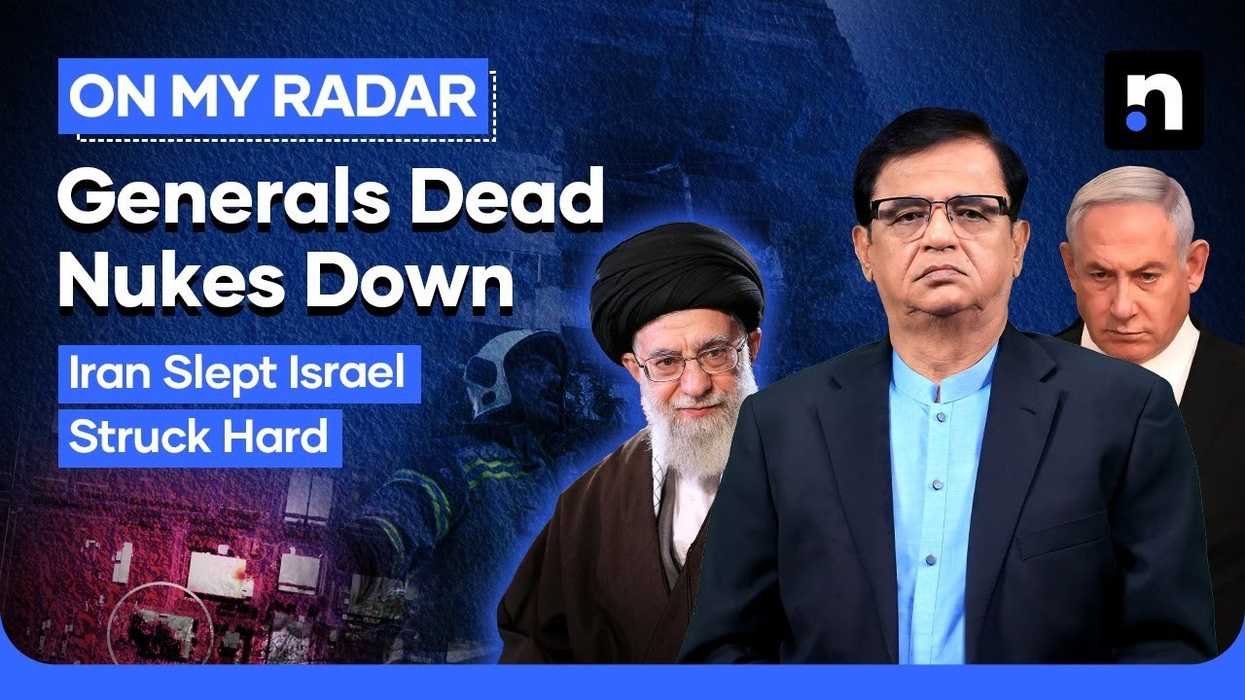Israel strikes Iranian military and nuclear sites in largest raid to date
Kamran Khan says Iran is in shock after its defenses failed to stop Israel’s devastating air assault
News Desk
The News Desk provides timely and factual coverage of national and international events, with an emphasis on accuracy and clarity.
Israel launched a sweeping aerial assault early Friday on Iranian military and nuclear installations, killing dozens of senior commanders and scientists in what appeared to be the most extensive direct strike between the two countries to date.
Iranian state media confirmed that at least 20 senior military officers and six nuclear scientists were killed in the coordinated air raids that struck Tehran and four other cities.
Among the dead were General Hossein Salami, the commander-in-chief of the Islamic Revolutionary Guard Corps (IRGC), and nuclear physicist Fereydoon Abbasi.
The attack, dubbed “Operation Rising Lion,” involved more than 200 Israeli fighter jets striking 100 preselected targets, including missile production sites, military housing complexes, and uranium enrichment facilities in Natanz, Tabriz, Khorramabad, Hamedan, and the capital, Tehran.
Despite public warnings and global anticipation of a possible Israeli attack, Iran’s air defense systems failed to intercept the incoming wave.
“It’s astonishing that Iran’s radar and missile defenses were either ineffective or simply non-existent,” said Kamran Khan said in his latest vlog. “This was not a surprise attack—the world was watching—and still, Iran had no real answer.”
The International Atomic Energy Agency confirmed that Israel targeted the uranium enrichment plant in Natanz and inflicted damage on the underground Fordow facility. Fuel enrichment sites in Tehran were also struck.
In response, Iran launched over 100 drones toward Israeli territory, but all were intercepted before reaching their targets, according to Israeli officials.
Iranian Supreme Leader Ayatollah Ali Khamenei condemned the airstrikes as a “war crime” and hoisted a red flag over the Jamkaran Mosque in Qom—a traditional symbol of vengeance.
“Israel has chosen a bitter fate,” Khamenei said in a televised address. “They have started this war. But it will be Iran who ends it.”
However, the Islamic Republic has yet to mount a meaningful military response. For now, Iran has closed its airspace and convened a high-level meeting of its National Security Council, which issued a brief statement vowing retaliation at a time of its choosing.
Defense Minister Aziz Nasirzadeh warned that U.S. military bases in the region could become targets if tensions escalate.
President Donald Trump, reacting on Truth Social, said he had warned Iran “many times” to back down and had offered opportunities for a nuclear deal.
Trump also reiterated that Iran must now agree to a deal or face even harsher consequences.
While the U.S. has denied involvement in the assault, officials confirmed Israel notified Washington in advance. Secretary of State Marco Rubio said the U.S. played no role in the operation and warned Tehran against targeting American interests.
Russia and China condemned the attack, calling it a violation of Iranian sovereignty. The Kremlin expressed concern over rising Middle East tensions, while Beijing said it opposes any breach of regional security and territorial integrity.
Israeli Prime Minister Benjamin Netanyahu defended the operation, stating that Iran’s leadership had repeatedly threatened to destroy Israel and that preemptive action was necessary.
According to The Guardian, Netanyahu had presented the military plan to Trump shortly after his re-election. Trump initially preferred diplomacy, and several rounds of indirect U.S.-Iran talks were held in Oman earlier this year.
Iran’s President Masoud Pezeshkian had only days ago rejected American demands to halt uranium enrichment. General Salami, who was killed in the attack, had declared Iran was fully prepared for war and had already identified Israeli targets.
Iran has faced a string of high-level assassinations and mysterious deaths in recent years, including the 2024 deaths of President Ebrahim Raisi and Foreign Minister Amir Hossein in a suspicious air crash. Over the past four years, Tehran has buried at least five top nuclear scientists and several senior IRGC commanders.
The loss of regional influence, particularly in Lebanon, Syria, and Gaza, has also weakened Iran’s strategic posture. Hezbollah and Hamas leadership figures were assassinated in 2024, and the collapse of Bashar al-Assad’s government in Syria further isolated Tehran.
Following the strike, Iran’s Supreme Leader appointed Major General Abdulrahim Mousavi as the new Chief of Staff and General Mohammad Pakpour as the new IRGC commander-in-chief.
Despite heavy casualties and infrastructure losses, Iran has not signaled readiness for full-scale war. Analysts say the country’s economy and military may not be equipped for sustained conflict.
The next round of U.S.-Iran indirect talks is scheduled for Sunday in Oman. Trump’s special envoy, Steve Witkoff, will lead the American delegation. Tehran has not confirmed participation.
“Unless Iran rethinks its strategy and recalibrates to current global realities,” Kamran Khan said, “it risks losing more than just its nuclear program—it risks regime collapse.”








Comments
See what people are discussing